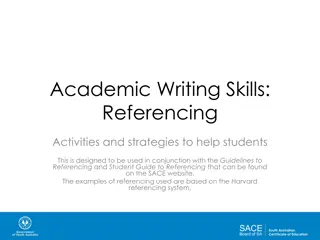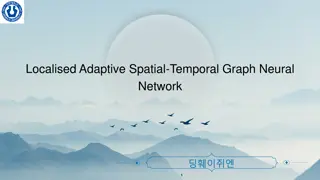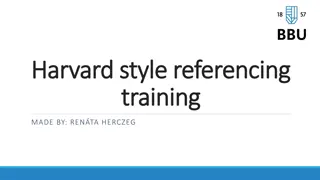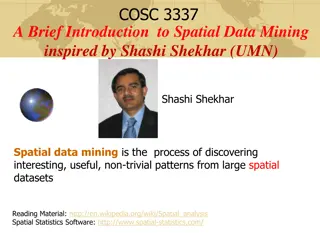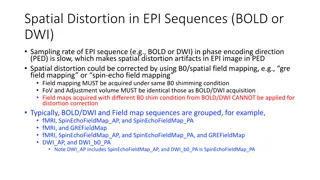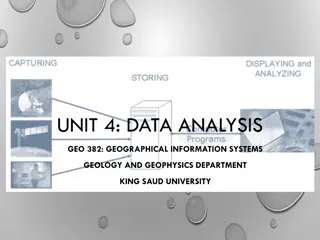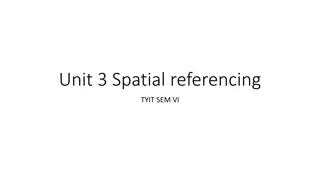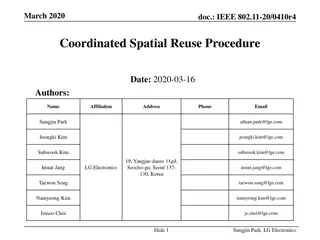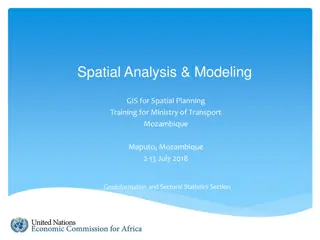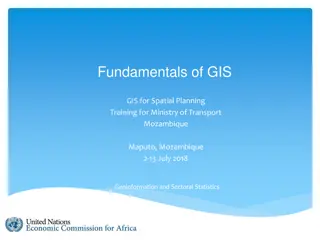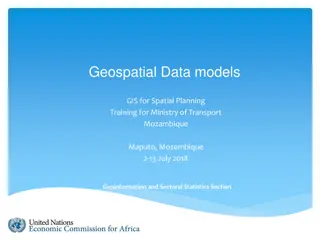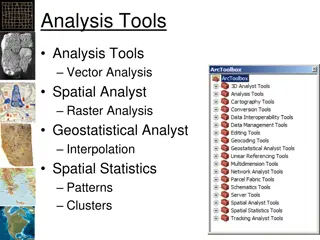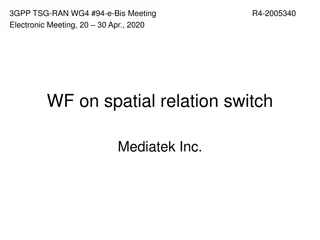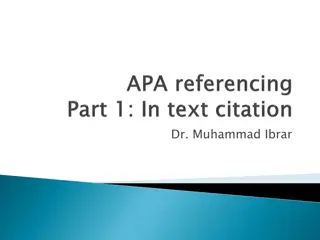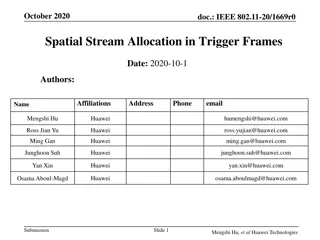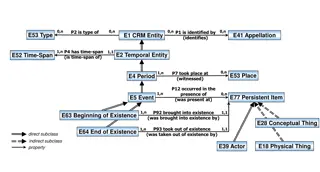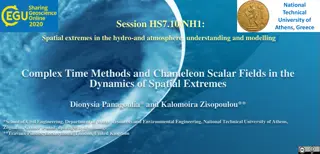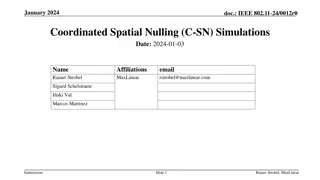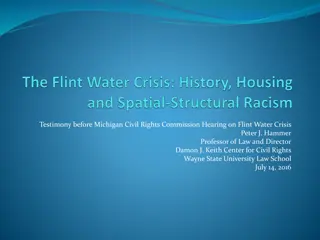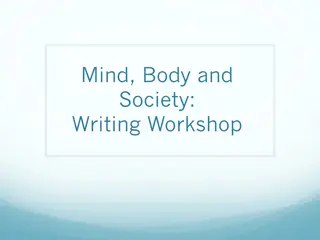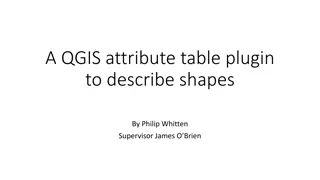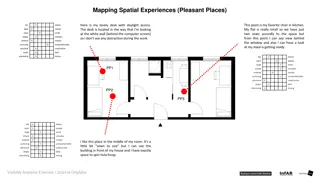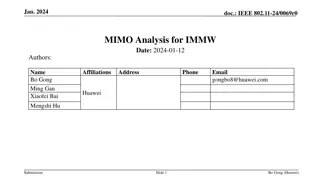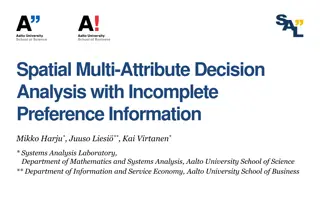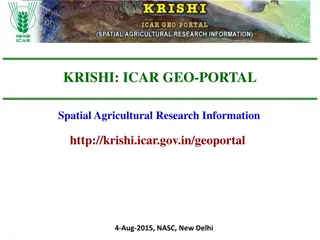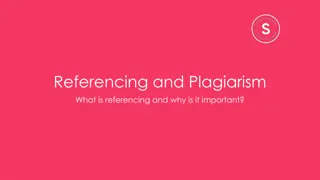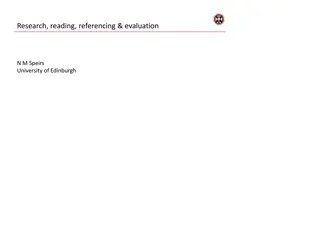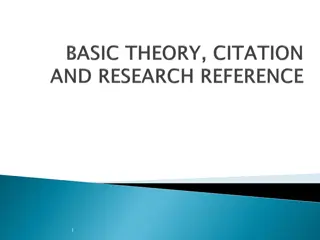WISK: A Workload-aware Learned Index for Spatial Keyword Queries
WISK, a workload-aware learned index that combines spatial and keyword queries to efficiently retrieve objects. It integrates spatial and textual indexes and considers query workload information.
1 views • 17 slides
Mastering Referencing Skills for Academic Writing Success
Enhance your academic writing skills with this comprehensive guide on referencing activities and strategies. Learn the importance of referencing direct quotations, ideas, tables, and images. Understand the elements required for in-text referencing and when to use "et al." Dive into practical example
3 views • 22 slides
Improving Academic Writing: Key Aspects of Academic Style and Referencing
Learn about academic style in English, principles of referencing, and how to write effectively for assignments. Understand the functions of academic style, such as clear communication and showcasing membership in the academic community. Explore a paragraph analysis on making people work harder, iden
0 views • 29 slides
fMRI Coregistration and Spatial Normalization Methods
fMRI data analysis involves coregistration and spatial normalization to align functional and structural images, reduce variability, and prepare data for statistical analysis. Coregistration aligns images from different modalities within subjects, while spatial normalization achieves precise anatomic
3 views • 35 slides
Coregistration and Spatial Normalization in fMRI Analysis
Coregistration and Spatial Normalization are essential steps in fMRI data preprocessing to ensure accurate alignment of functional and structural images for further analysis. Coregistration involves aligning images from different modalities within the same individual, while spatial normalization aim
6 views • 42 slides
Localised Adaptive Spatial-Temporal Graph Neural Network
This paper introduces the Localised Adaptive Spatial-Temporal Graph Neural Network model, focusing on the importance of spatial-temporal data modeling in graph structures. The challenges of balancing spatial and temporal dependencies for accurate inference are addressed, along with the use of distri
3 views • 19 slides
Harvard Style Referencing and Avoiding Plagiarism
Learn about Harvard referencing style, the importance of avoiding plagiarism, and how to create in-text references properly. Understand the BBU FCHT Harvard system for author-year method referencing and how to cite books and book chapters effectively.
1 views • 24 slides
Introduction to Spatial Data Mining: Discovering Patterns in Large Datasets
Spatial data mining involves uncovering valuable patterns from extensive spatial datasets, offering insights into historical events, environmental phenomena, and predictive analytics. Examples range from analyzing disease outbreaks to predicting habitat suitability for endangered species. The applic
2 views • 20 slides
Advanced Techniques in 3D Scene Analysis for Spatial Understanding
Cutting-edge research in 3D scene analysis focuses on sequenced predictions over points and regions for comprehensive spatial understanding. The approach involves contextual classification, overcoming limitations of classical graphical models through innovative inference machines that prioritize tra
0 views • 40 slides
Understanding Spatial Database Systems: An Overview
This presentation by Xiaozhi Yu introduces the fundamentals of spatial database systems, covering topics such as spatial data types, relationships, system architecture, modeling, and organizing underlying spaces. It delves into the importance of integrating geometry into DBMS data models, spatial in
2 views • 30 slides
Spatial Distortion Correction in EPI Sequences: Field Mapping Examples
Spatial distortion artifacts in EPI sequences (BOLD or DWI) due to slow sampling rates in the phase encoding direction can be corrected using B0/spatial field mapping techniques. This correction requires obtaining field maps under the same B0 shimming conditions and with identical FoV and adjustment
1 views • 4 slides
Understanding Spatial Analysis in GIS for Effective Decision-Making
Spatial analysis in GIS involves modeling geographic problems, processing data, and exploring results to understand spatial relationships, patterns, and suitability for various purposes. GIS tools offer unique capabilities for handling geographically referenced data, data entry, storage, manipulatio
3 views • 21 slides
Understanding Spatial Referencing Systems for Mapping
Spatial reference systems play a crucial role in defining geographic parameters and coordinate systems for mapping. They consist of components like orientation, latitude, longitude, and elevation, which help in representing spatial properties on maps. Reference surfaces such as the Geoid and ellipso
4 views • 13 slides
Understanding IEEE 802.11-20/0410r4 Coordinated Spatial Reuse Procedure
This document presents the Coordinated Spatial Reuse (CSR) procedure in IEEE 802.11-20/0410r4, focusing on the transmission schemes and necessary information for effective spatial reuse. It outlines the topology of CSR environments, acquisition of information for CSR, CSR capability announcement by
10 views • 23 slides
Spatial Analysis & Modeling for Spatial Planning Training in Maputo, Mozambique
Explore spatial analysis techniques for efficient route planning, site selection, pattern identification, and value prediction in the context of spatial planning. Learn about surface modeling, relationships among features, and the importance of spatial modeling in addressing geographical problems.
0 views • 27 slides
Understanding the Components of GIS for Spatial Planning
A geographic information system (GIS) is a powerful tool for capturing, storing, analyzing, and presenting spatial data. This training program explores the fundamentals of GIS, including software and hardware components, data considerations, and the importance of people and policies in utilizing GIS
6 views • 16 slides
GIS Data Models for Spatial Planning Training in Maputo, Mozambique
Explore the concepts of GIS data models including vector vs. raster, spatial relationships, spatial operations, and representation of real-world entities in a spatial database. Understand how spatial data models are used to manipulate spatially-referenced information and define the spatial location
1 views • 32 slides
Understanding Spatial Autocorrelation in Geostatistical Analysis
Explore the concept of spatial autocorrelation, its implications in geostatistical analysis, and the importance of detecting and interpreting it correctly. Learn about auto-correlation, signal components, correlation significance, and measuring autocorrelation using tools like Moran's I. Gain insigh
0 views • 12 slides
Mastering OSCOLA Referencing: Essential Guidelines for Academic Writing
Explore the key principles of OSCOLA referencing including consistency, footnote usage, repetition of information, citing the same source multiple times, utilizing Latin terms like ibid, punctuations, and handling quotations based on OSCOLA guidelines and Anglia Ruskin requirements.
0 views • 12 slides
Referencing
Understand the importance of referencing, learn how to cite sources properly within your text and create a reference list. Discover why referencing is crucial in academic work to avoid plagiarism and demonstrate your research skills.
0 views • 15 slides
Future Directions for GIS in Samoa
Enhancing GIS practices in Samoa involves establishing a Samoa GIS User Group, improving spatial data management, developing a national spatial data infrastructure framework, and implementing GIS applications in various sectors like emergency response, public access, and natural resource management.
3 views • 12 slides
Spatial Relation Switching Requirements in 3GPP NR RAN Plenary Meeting
The document discusses various spatial relation switching requirements for uplink scenarios in the 3GPP NR RAN Plenary Meeting. It covers agreement points related to UL SRS, PUCCH, P-SRS, and DL-RS, defining delay requirements and known conditions for spatial relation switching. The agreements provi
0 views • 11 slides
Mastering Source Citation Techniques for Research and Assignments
Explore the essential elements of referencing styles, including in-text citations and reference lists. Learn how to credit sources properly, cite ideas and theories, and direct readers to full source details. Understand the rules for citing authors, quoting specific parts, and referencing multiple a
2 views • 12 slides
Spatial Stream Allocation in IEEE 802.11-20 Trigger Frames
The document discusses spatial stream allocation in IEEE 802.11-20 trigger frames, specifically focusing on the SS Allocation subfield. It explains how trigger frames allocate resources for TB PPDU transmissions and solicit User Info fields, detailing the RU Allocation and SS Allocation subfields. T
4 views • 15 slides
Understanding Temporal and Spatial Information Models
This content delves into the intricacies of temporal and spatial information models, covering concepts such as existence, presence, and spatiotemporal relationships. It explores how entities are identified, events are witnessed, and durations are defined within these models. The interplay between ti
3 views • 9 slides
Understanding Referencing in Academic Writing
Explore the importance of referencing in academic writing, how to cite sources properly using the Harvard system, and avoid plagiarism. Learn what information is needed for referencing and how to create reference lists and bibliographies.
0 views • 19 slides
Understanding Spatial Extremes: Complex Time Methods in Hydro-Atmospheric Dynamics
This study explores the use of complex time methods and chameleon scalar fields in understanding and modeling spatial extremes in hydrological and atmospheric systems. By transforming Lagrangian processes and introducing chameleon scalar fields, the research unveils new insights into the mechanism g
0 views • 9 slides
Coordinated Spatial Nulling (C-SN) Simulations in IEEE 802.11-24/0012r0
The document discusses the concept of Coordinated Spatial Nulling (C-SN) in IEEE 802.11-24/0012r0, focusing on spatial nulling feedback, synchronization needs, advantages of partial nulling, and comparison of half-coordinated versus fully coordinated scenarios. Simulation results are presented, anal
0 views • 19 slides
Understanding Spatial Racism and Its Role in the Flint Water Crisis
Professor Peter J. Hammer's testimony before the Michigan Civil Rights Commission sheds light on the historical lineage of spatial racism in Flint and Genesee County. The interaction between beliefs and institutions over time has shaped racial oppression, from slavery to current issues such as the F
0 views • 38 slides
Writing Workshop: Referencing Techniques and Essay Planning
This content provides guidance on referencing in academic writing, including footnotes and bibliography for books and articles, as well as an exercise to practice proper referencing. It also offers tips on planning an essay effectively, such as analyzing the essay title, identifying historical probl
0 views • 11 slides
Enhancing Spatial Data Analysis in QGIS
Explore the integration of relational databases with QGIS to facilitate efficient spatial data analysis. Discover the importance of recognizing spatial relationships within data sets and the solutions to enhance QGIS for relational datasets. Overcome challenges and delve into the intersection and su
0 views • 25 slides
Spatial Experiences in a Small Flat
Mapping spatial experiences in a small flat, this content describes pleasant and unpleasant places within the living space. It highlights favorite spots like a kitchen chair with a view, a cozy desk for work, and a room with enough space for activities. In contrast, it mentions bothersome areas like
0 views • 10 slides
Understanding Plagiarism: Types, Consequences, Referencing, and Paraphrasing
Plagiarism involves using someone else's work without acknowledgment, with intentional and unintentional forms. It can lead to severe consequences. Referencing and paraphrasing are key strategies to avoid plagiarism, using the Harvard Author-Date method. Proper in-text referencing and citation are c
0 views • 26 slides
Mastering Harvard Referencing for Academic Writing
Learn the essentials of Harvard referencing for academic writing, including in-text citations and reference lists. Understand the difference between a bibliography and reference list, and discover how to create a hanging indent in Word for your citations.
0 views • 35 slides
Analysis of MIMO for IMMW Transmission in IEEE 802.11-24
Proposal discusses the suitability of MIMO for IMMW transmission under different scenarios. The analysis focuses on the number of spatial streams based on channel rank and quality, recommending dual-polarization for LOS paths supporting 2 spatial streams and spatial separation for larger devices sup
0 views • 16 slides
Spatial Multi-Attribute Decision Analysis with Incomplete Preference Information
In this study by Mikko Harju, Juuso Liesi, and Kai Virtanen from Aalto University, the focus is on spatial decision analysis for scenarios where decision alternatives have varying consequences across a geographical region. The research delves into the significance of spatial value functions in repre
0 views • 19 slides
ICAR KRISHI Geo-Portal: Spatial Agricultural Research Information
ICAR KRISHI Geo-Portal is a digital platform aiming to facilitate spatial agricultural data generation, compilation, visualization, and analysis. It hosts spatial databases, provides map services, and allows data sharing across platforms. The portal, developed using open-source technologies, offers
1 views • 32 slides
Importance of Referencing and Avoiding Plagiarism in Academic Writing
Referencing is vital to give credit, avoid plagiarism, and guide readers to further resources. Plagiarism, whether reckless or deliberate, is considered cheating and must be avoided to maintain academic integrity. Understanding when and how to reference is crucial in academic assignments.
0 views • 8 slides
Enhancing Research Skills: Reading, Referencing, and Evaluation
Explore the importance of research, reading, referencing, and evaluation in academic learning, alongside tips on sourcing reliable information, analyzing content, and using proper referencing styles.
0 views • 16 slides
Guide to Enhancing Research Skills in Science and Academia
Deepen your knowledge by exploring related research topics, understanding the state of the art, and clarifying issues. Learn how to utilize scientific journals, theses, conferences, and online resources effectively. Enhance your research by employing proper citation rules, referencing frameworks, an
0 views • 15 slides

